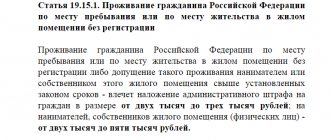Options
Is it possible to expel a minor child from the grandmother's apartment?
Maybe she just needs to want it. How can a grandmother sign a minor child out of her apartment?
This can be done by mutual agreement with the parents - in this case, all participants in the transaction simply come with their passports to the Management Company or the migration service department and draw up the appropriate papers.
If one of the parties resists, this will be carried out by the court . True, a number of nuances will play a role here:
- the status of the grandmother’s apartment, whether it is municipal or privately owned;
- does the child have a share in this apartment or is he simply registered;
- under what conditions he will be discharged.
As a matter of fact, the court can unequivocally say “no” in one case - the apartment is municipal and the child is a participant in privatization.
If a relative is the sole owner of square meters, then she will not have any problems with registering her grandson or granddaughter.
The judge will rely on Art. 20 of the Civil Code of the Russian Federation - the child’s place of residence is where his mother and father live - and Art. 31 Housing Code of the Russian Federation.
Find out on our website how to register a child when selling an apartment, as well as how to register children and at the same time register them at a different address.
Can a grandmother sign her granddaughter out of the apartment?
Hello Olesya! The Resolution of the Plenum of the Armed Forces of the Russian Federation dated July 2, 2009 N 14 “On some issues arising in judicial practice when applying the Housing Code of the Russian Federation” provides clarifications on the application of these norms of housing legislation: resolving disputes about the recognition of a tenant, a family member of the tenant or a former family member of the tenant of a residential premises who have lost the right to use residential premises under a social tenancy agreement due to their constant absence from the residential premises due to leaving the premises, the courts must find out: for what reason and for how long the defendant is absent from the residential premises, whether his departure from the residential premises is necessary forced (conflictual relationships in the family, divorce) or voluntary, temporary (work, training, treatment, etc.) or permanent (took out your belongings, moved to another locality, entered into a new marriage and lives with a new family in other residential premises, etc.), whether there were any obstacles to him in using the residential premises from other persons living in it, whether the defendant acquired the right to use another residential premises in a new place of residence, whether he fulfills his obligations under the contract to pay for residential premises premises and utilities, etc. If the court establishes circumstances indicating the defendant’s voluntary departure from the residential premises to another place of residence and the absence of obstacles to the use of the residential premises, as well as his unilateral refusal of rights and obligations under the social tenancy agreement, the claim to recognize him as having lost the right to residential premises is subject to satisfaction on the basis of Part 3 of Article 83 of the Housing Code of the Russian Federation in connection with the termination of the social tenancy agreement by the defendant in relation to himself. The absence of a citizen who voluntarily left a residential premises for another place of residence, in the new place of residence, the right to use residential premises under a social tenancy agreement or the right of ownership of residential premises cannot in itself be a basis for recognizing the absence of this citizen in the disputed residential premises as temporary , since, according to Part 2 of Article 1 of the Housing Code of the Russian Federation, citizens, at their own discretion and in their own interests, exercise their housing rights. A citizen’s intention to refuse to use residential premises under a social tenancy agreement can be confirmed by various evidence, including certain actions, collectively indicating such an expression of will of the citizen as a party to the residential tenancy agreement.
Thus, a grandmother can expel an adult granddaughter from an apartment if she has not moved into the apartment or has not lived in it for a long time (in this case, at least 3 years must have passed from the moment she came of age, since until the age of 18, her place of residence was determined by her parents and her non-residence in the apartment during her minority period is not taken into account), she does not incur expenses for housing and utilities, and no obstacles are created for her in moving in, and there are no conflicting relationships. As for registering other persons in the apartment, under a social tenancy agreement, the tenant has the right to register only members of his family in the apartment, i.e. relatives, this requires the consent of all persons registered in the apartment.
How to deregister?
How to expel a minor child from his grandmother's apartment? Let’s assume that relatives reach a consensus on where the little citizen will live next.
In this case, you will need to come to the passport office of the Management Company or the Federal Migration Service (grandmother, child and one of the parents) and provide the following documents:
- departure slip;
- ID cards of all participants;
- application in form 6;
- documents for a new place of residence (order, social tenancy agreement, certificate of ownership);
- permission from the board of trustees (if the apartment is municipal or the child is a co-owner);
- an extract from the house register and a copy of the personal account (if the housing is municipal)
The procedure will take from three to ten days and that’s it, after this period the child will receive a passport with a stamp of new registration. Those who, due to age, do not yet have a passport, receive a certificate of registration (Form 8).
You can learn about whether it is possible to remove children from an apartment without the consent of their mother, as well as whether a father can discharge a minor child after a divorce from our articles.
What documents are needed for discharge?
First, let us clarify that the extract itself can be done in two ways:
- extract only;
- extract simultaneously with registration.
This should be the minimum required set of documents:
| Extract in “pure form” | Simultaneous registration and discharge |
Application for discharge in free form. The application must indicate:
If the child is under 14 years old, then the parent fills it out, if older, then fills it out himself. | Application for registration in form No. 6 with a completed tear-off coupon (additional sheet). Application forms at the passport service information stands. If under 14 years old, then the parent fills it out, if older, then fills it out himself (see how to register a child) |
| Child's birth certificate or passport (if he is over 14 years old) | Child's birth certificate or passport (if he is over 14 years old) |
| Parents' passports | Parents' passports |
| Consent of the parent with whom the child will not live. Given to the passport officer who accepts documents for discharge. Peculiarities:
| The parent’s consent to discharge and registration, with whom the child will not live at the same address. Peculiarities:
|
| Pre-authorization of guardianship (if required). | Pre-authorization of guardianship (if required). |
| House book (if a private house). | Documents for a new apartment (ownership certificate or extract from the Unified State Register of Real Estate). |
| Departure sheet (form No. 7). If the child is under 14 years old, then the parent fills it out, if older, then fills it out himself. |
When only check-out is possible (without simultaneous registration)
When selling a child's apartment, however, new housing was not purchased (money was transferred to a personal account) or was purchased in a house under construction. But parents must take care of at least temporary registration. For example, with relatives. Otherwise, they will face a fine of 2 thousand to 5 thousand rubles. and troubles from the guardianship authority;
Moving a minor abroad. Either with the family forever or for a long time (for example, to study);
Eviction of a child by court. If the parents have lost the right to live at a specific address and the child does not live there. The owner can evict a small tenant through the court;
There are other situations as well.
When is guardianship approval needed?
Deregistration simultaneously with the sale of the child’s home.
If the minor refuses privatization. That is, he moves out of the apartment where he is not the owner, but has a lifelong right of residence.
Eviction from public housing. Regardless of possible combinations.
Termination of registration by court. The guardianship expresses its opinion in court, as a participant in the court case.
Differences in deregistration of a teenager aged 14 to 18 years and a child aged 0 to 14 years
| Requirements and conditions | from 0 to 14 | From 14 to 18 |
| At the new address, accommodation will be with parents (one of the parents) | Necessarily | Not necessary |
| Extract from the place where both parents remain to live | Not possible | Possible |
| Discharge applications and departure forms are filled out independently | No | Yes |
Need to know! If a child is discharged from his own privatized apartment with its sale, and a new one has not yet been purchased, then guardianship gives permission for discharge when opening a personal bank account for the child, where the money from the sale of housing is transferred. If this condition is violated, the statement will be reinstated.
Through the court
How to discharge grandchildren from an apartment in court? If you still cannot resolve the issue through agreement, you should go to the district court at the defendant’s place of residence .
In this case, it is better for the grandmother not to seek justice herself, but to contact a good lawyer specializing in housing law.
The fact is that the court pays special attention to cases where the rights of minors or constitutional human rights are affected. The slightest flaw, as it seems to you, will give your opponent an advantage, and the judge will have doubts about the need to satisfy the claim.
The grandmother will have to justify to the court the need to discharge the little man.
For example, this is the sale of an apartment, the grandson does not actually live there, or simply relations with relatives have ceased to be cloudless.
You will also have to indicate the fact that the child will not be discharged to an “empty place” . True, usually, if we are talking simply about registration, and not about the division of real estate, the servant of Themis satisfies the claim without questions.
The statement of claim is drawn up in triplicate and must contain :
- full name of the court site;
- passport information of the plaintiff, defendant, child;
- the essence of the problem, briefly;
- requirement to deregister;
- date, signatures.
After the court makes a decision (it can take up to a month), you can go with this document to the migration service and finish the job there.
Archive number No. 4 (1319) dated January 28, 2021 - Consumer
LEGAL CONSULTATION
“I live alone in a 3-room apartment, I am its owner.
Three people were registered in it: me, my son and my three-year-old granddaughter. My son recently died. I want to sell the apartment and buy a smaller one. I suggested that my daughter-in-law sign her granddaughter out, but she doesn’t want to, although she has her own apartment where she lives with her granddaughter. What should I do?" Olga, Kursk. [td]
First of all, you should know that the place of residence of a minor child is the place of residence of his parents. In life, spouses can be registered in different places, but live together in an apartment for commercial rent or in an apartment owned by one of the spouses, and everyone is happy with this situation. With the death of his son, the situation changes. The child must live and be registered in the residential area where his mother is registered.
The daughter-in-law does not want to deregister the child from you, thereby pursuing the goal of securing this housing for her daughter in the future, creating certain obstacles for you to sell a larger apartment and buy a smaller one in area, and therefore in cost. It will be difficult for you to sell the apartment where the child is registered, since it violates the child’s rights to housing. In this case, the child must be registered in the purchased apartment. There is only one way out - filing an application with the court.
Only by a court decision will the granddaughter be deregistered without the mother’s consent, and you will be able to sell the apartment and buy a smaller home.
Lawyer Elena LEUKHINA answered the question. Lawyer's office address: Kursk, st. Radishcheva, 17, office 13. Make an appointment by calling 8-910-312-16-71 and 8-950-873-70-99.
To always keep abreast of events, subscribe to the news For each other Kursk Online in Yandex.Zen
Join our groups on social networks VKontakte, Odnoklassniki, Facebook. Events are brighter with us!
Share link:
Subscribe to “For Each Other”:
Yandex News Yandex Zen Google News YouTube Video










